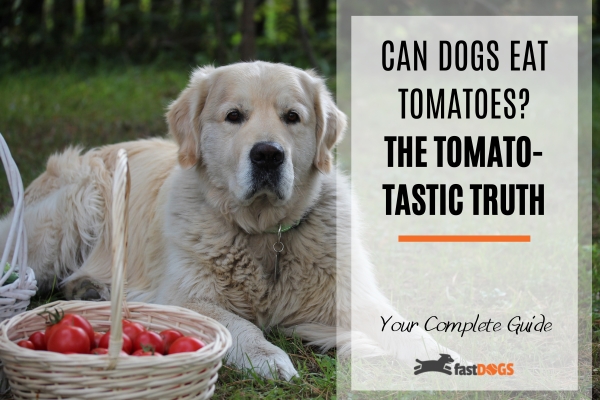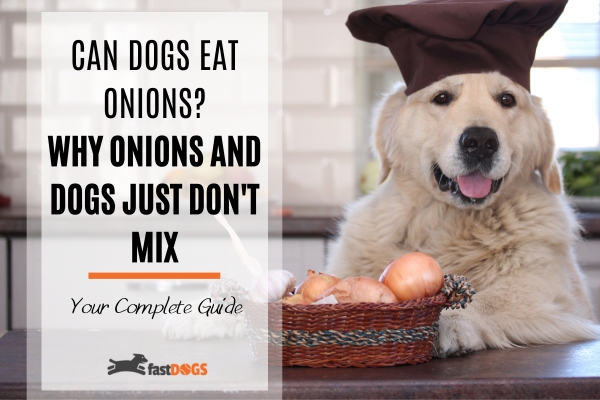Can Dogs Eat Cheese? The Cheesy Truth Revealed
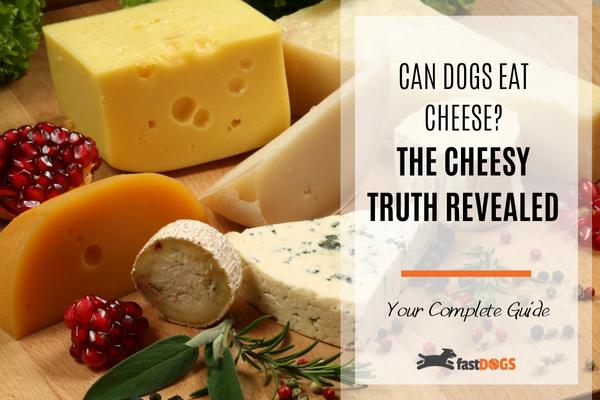
The Big Cheese Question — Can Dogs Eat Cheese?
Ever caught your dog eyeing up your cheese-loaded pizza as you wolf it down? You may have been wondering if it’s safe to share a bit of cheese with your furry best friend. Many of us are partial to cheese, and it even offers some nutritional benefits to us humans, but can dogs eat cheese?
It’s a perfectly logical question — let’s take a look at the pros and cons of feeding your dog cheese and its many various forms.
Can Dogs Eat Cheese? Contents
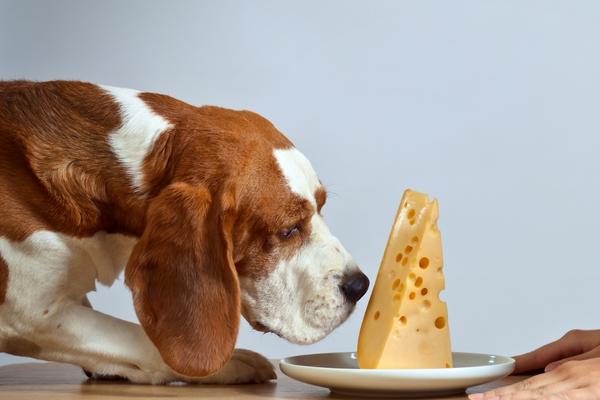
Can Dogs Eat Cheese?
The short answer is — yes.
Although there are exceptions (more on that later), cheese in general doesn’t contain any toxic ingredients for dogs. In fact, cheese can be a great training tool for your family pet, especially during puppyhood.
However, while some dogs can eat cheese, and most will love it too, dogs with an intolerance to lactose — found in dairy products — cannot.
Even if your dog can tolerate cheese, it should only be given occasionally. The 10% daily calorie intake for treats applies to cheese — it’s not essential to a well-balanced diet for a dog.
Furthermore, broccoli serves as an excellent mineral source — including magnesium, sodium, potassium, and chromium — all of which contribute to bolstering the immune and nervous systems in dogs.
Is Cheese Good for Dogs?
Nutritional Benefits
As a dairy product, cheese is rich in calcium, which maintains the bone and dental health of your pup. Healthy, strong bones are essential for dogs who lead an active lifestyle.
Cheese also contains:
Protein — provides fuel, helps preserve muscles, and is an all-around vital macronutrient for your dog’s body.
Vitamin A supports many functions in the body, such as vision, skin health, immune system, and organ development.
Essential fatty acids — omega-3 and 6 — can improve skin and coat health.
Vitamin B12 boosts a dog's metabolism and supports a healthy gut, which can help prevent gastrointestinal issues.
Vitamin K2, a nutrient that supports brain function, is found in certain types of cheese.
When Is Cheese Bad for Dogs?
Lactose Intolerance
Just as some humans can be lactose intolerant, so can many dogs. This food sensitivity occurs when a dog cannot produce enough lactase — the enzyme responsible for breaking down lactose — a type of sugar found in dairy produce.
Although lactose in cheese is relatively low in comparison with full-fat milk, if your pooch has a severe case of lactose intolerance, they will likely have adverse reactions when fed cheese, even in small amounts.
You’ll know about it if your pooch suffers from lactose intolerance — symptoms include:
Bad gas.
Stomach upset.
Diarrhea.
Vomiting.
Bloated stomach.
Appetite loss.
If you notice any symptoms of gastro distress when feeding your dog cheese for the first time, speak to your vet about it. It may not be suitable for your pup.
Calorie Laden
One of the reasons cheese tastes so good is its high-fat content. However, this also means it's heavy on calories, which may cause health issues. Long-term, the risk of obesity and diabetes is higher, yet some overly sensitive dogs can develop pancreatitis after eating cheese for the first time. Breeds like Schnauzers and Cocker Spaniels are prone to pancreatitis.
High Salt Content & Added Ingredients
High levels of sodium in some salty cheeses can be a problem for dogs who suffer from kidney disease. Other cheeses may have added ingredients known to be toxic to canines, such as onion, chives, or garlic. Also, avoid any cheeses, such as Monterey Jack with chili peppers or spices added, which can aggravate a pup’s stomach.
What Cheese Dogs Can Eat — And What To Avoid
You may be wondering if cheese is safe for dogs at all after all the warnings of how cheese can be bad for a pup. Let’s take a look at how the more commonly seen cheeses fit:
Can Dogs Eat Processed Cheese?

Let’s start with the big one, the cheese that almost every household will have in their refrigerator at some time or another. But are those “plastic” slices of cheese you put on your burger safe for dogs?
Officially yes, there’s nothing toxic found in most processed cheese slices or even blocks of processed cheese. Just be wary of any added ingredients that may be toxic to your pooch (i.e., onions, garlic, certain fruits, etc.).
Just because it’s safe to feed your pooch processed cheese doesn’t necessarily mean you should! Although low-calorie and low-sodium processed cheeses are available, the processing stage of the cheese production often removes many of the macronutrients (if not all), which can be beneficial to your pup’s health.
In short, they’re empty calories — even if they’re “low” empty calories!
Can Dogs Eat Cheddar Cheese?
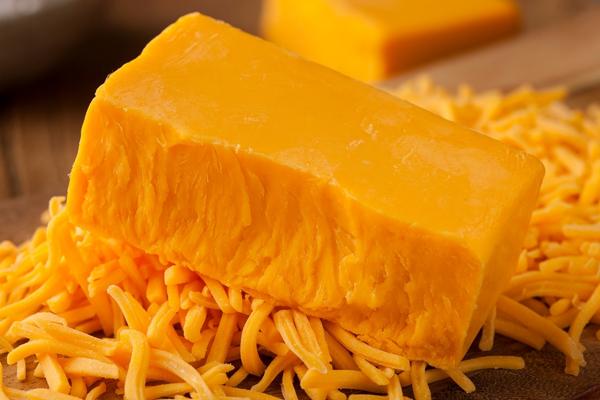
One of the most popular cheeses worldwide, especially on the other side of the pond in the UK, aged cheeses, like cheddar, contain less lactose. That said, they may still have high levels of saturated fats and calories. Low-calorie versions are also available and are a better option!
However, be careful of added ingredients, such as colorings, preservatives, or ingredients known to be toxic to dogs, such as onions, chives, and even raisins.
Can Dogs Eat Cottage Cheese?
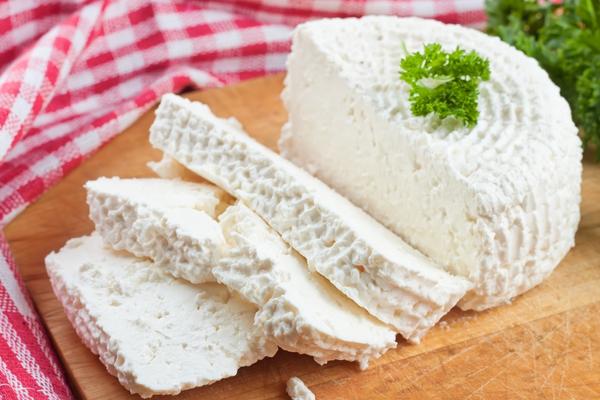
Cottage cheese can be the ideal cheese to treat your pooch with, it has a low-fat content, is typically low calorie, and has a lactose content lower than most other varieties of cheese. The bland flavor of cottage cheese can also be ideal for a pup recovering from an upset stomach.
A great source of protein and calcium, you can even get no-sodium-added cottage cheese, which usually only has about 29 mg of sodium per cup — much lower than the average cheese.
Can Dogs Eat Cream Cheese?
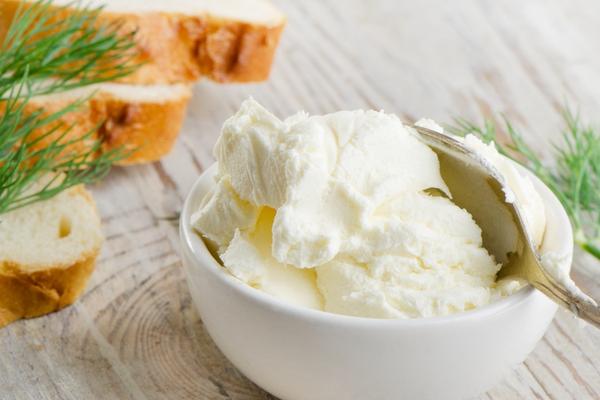
Although cream cheese is generally low in lactose and lower in sodium, it can be very high in saturated fats and calories. Sometimes cream cheese also contains certain toxic-for-dogs additives such as chocolate, nutmeg, xylitol, garlic, or chives.
Hence, feeding your dog fatty cream cheese isn’t a good idea, even in smaller quantities.
Can Dogs Eat Mozzarella Cheese?
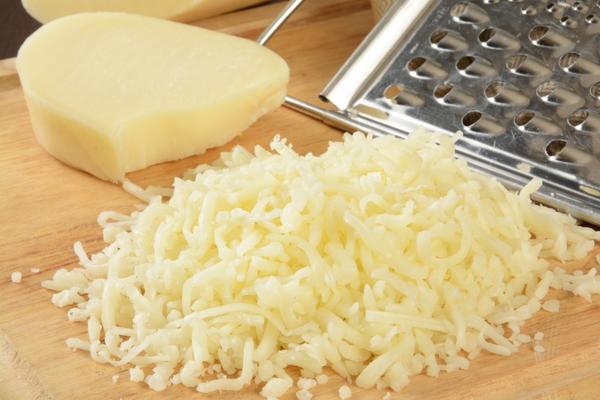
Yes. It's safe for dogs. Fresh mozzarella cheese is typically low in fat and sodium, depending on the milk used to produce the cheese.
Classic mozzarella is made using buffalo milk, which contains the protein A2 casein that’s well tolerated by dogs. However, you should always cut mozzarella into small pieces rather than serve in the little balls you often see. And, regard it as a treat.
Can Dogs Eat Parmesan Cheese?
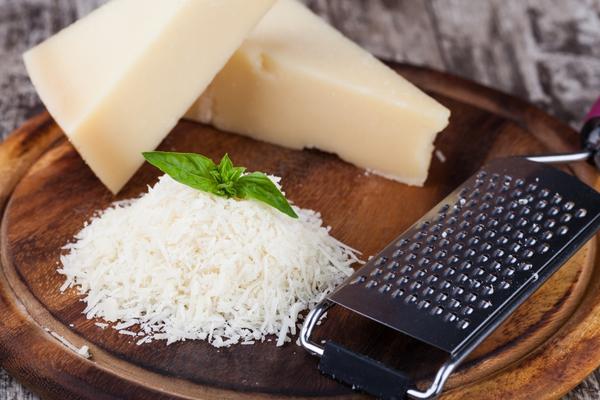
Parmesan cheese can be safe for dogs to eat. However, with a high-fat content and high salt levels compared to other cheese, it’s not a healthy option.
Yet, given the strong and often pungent smell, your dog is unlikely to want to eat this cheese. And, as a dog’s sense of smell and taste are connected, if they don’t like the smell of something, it’s doubtful they’ll try it.
Can Dogs Eat Swiss Cheese?
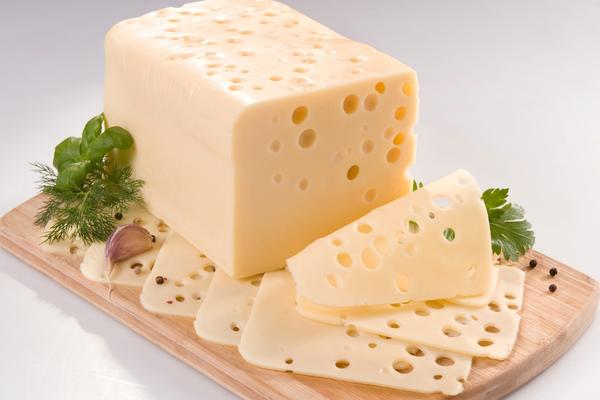
Swiss cheese is low in sodium and lower in lactose than many other cheeses, making it easier for your pup to digest.
Unfortunately, it’s relatively high in calories when compared with many other cheeses. So, if your dog is overweight, or prone to gaining weight, it’s not the best choice — regardless of how many holes are in the slice.
Can Dogs Eat Feta Cheese?
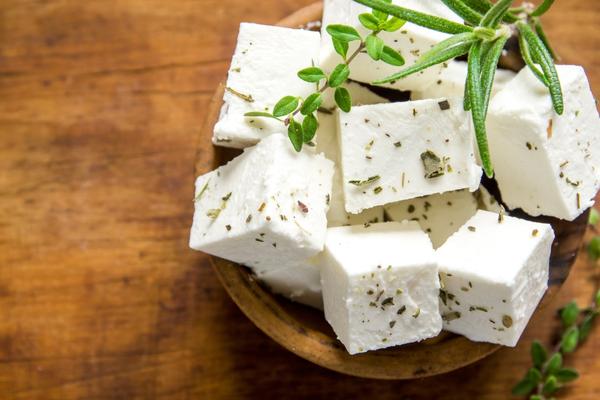
This cheese is traditionally made using sheep’s milk or a blend of sheep and goat milk, both of which contain galactose, not lactose. Canines find this type of sugar much easier to break down — so, suitable for dogs with intolerances.
That said, be mindful that some “budget” feta cheese brands may use high-lactose cow’s milk. Plus, as a brined cheese, Feta often has a higher salt content, which can be harmful to a canine’s kidneys. Ensure you thoroughly rinse feta cheese before offering to your pooch to remove any excess salts.
Can Dogs Eat String Cheese?
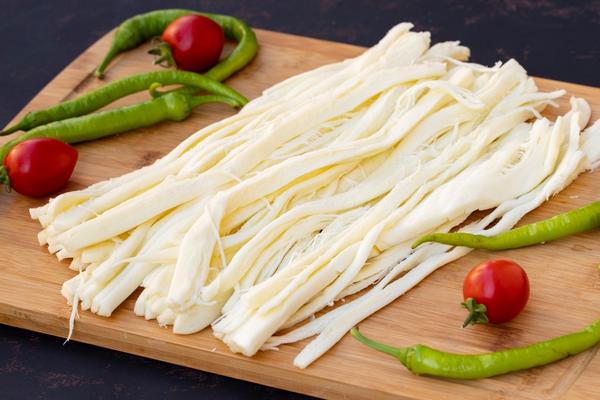
Yes. But opt for low-fat or skimmed mozzarella string cheese. This kind has the lowest levels of lactose found in any cow’s-milk-type cheese.
However, string cheese can pose another potential issue. Thanks to its stringiness, it can be a choking hazard for smaller dogs and potentially cause an intestinal blockage if gulped down too quickly.
Avoid serving to smaller dogs and always chop into shorter strings.
Can Dogs Eat Blue Cheese?
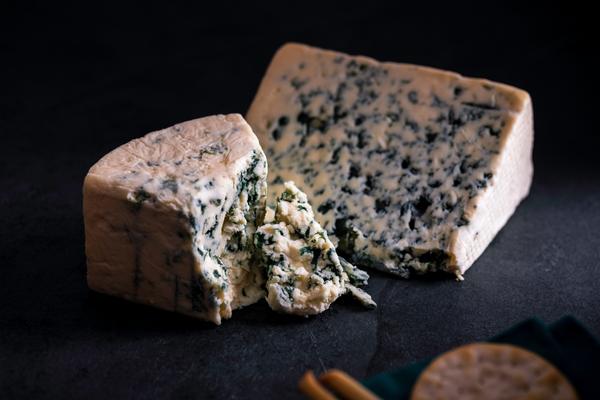
No, they can’t. Blue-veined cheese is a type of cheese you shouldn’t feed your pooch. The edible mold found in Roquefort, gorgonzola, or stilton creates a substance called roquefortine, which is highly toxic to canines and can cause vomiting and seizures.
How To Feed Your Dog Cheese?
You should always view cheese as a treat for your pooch — although it has some nutritional benefits, they aren’t essential if your dog is following a well-balanced diet.
If you’re using the cheese as a reward during training your pooch, or to hide your dog’s medication, make sure the portions are small and served infrequently. And, while cheese is widely recognized as one of the best ways to hide the taste of meds from your pooch, it shouldn’t be used to administer antibiotics.
What’s more, try to choose a cheese that’s low in fat, sodium, and lactose when possible.
Feeding Guide
How much cheese a dog can handle depends on their size — the smaller the dog, the smaller the amount.
Extra small or toy breeds (under 20 pounds) — one to two pieces (approx 0.5 wide by 0.25 inches thick).
Small dogs (21 - 30 pounds) — two to three pieces (approx 0.5 wide by 0.25 inches thick).
Medium to large dogs — (31 - 50+ pounds) five to six 0.5-inch cubes (as long as it’s low lactose).
You could even spoon some cottage cheese or grate a little cheese over the top of their regular dog food. Remember though, cheese is a treat and should only make up 10% of their daily allowance, the other 90% coming from a well-balanced dog food.
Final Thoughts
Most cheeses aren’t toxic to your pooch (blue cheeses being the biggest exception). Yet some varieties are far better for your dog than others — fat and salt content, plus lactose levels all play their part.
And, your dog will probably love the taste of cheese, which makes giving meds to an uncooperative canine far more convenient. But, there are other snacks out there without the high-calorie content, like blueberries or many other types of fruits.
Yes, it’s safe to feed your dog cheese, and they will probably love you more for it too, but rather than asking can dogs eat cheese, perhaps you need to ask — should they eat cheese?Can Dogs Eat Cheese? FAQs
Can Dogs Eat Unpasteurized Cheese?
Some dogs may like the taste of unpasteurized cheese, but you should avoid it. Many unpasteurized cheeses, especially the soft cheeses contain a listeria-causing bacteria, which can be harmful to your pup’s health.
What Cheese Can Dogs Not Eat?
Your dog should avoid any blue-veined cheeses, as the mold-forming compounds are toxic to dogs. These include:
Danish blue.
Roquefort.
Stilton.
Gorgonzola.
Cabrales.
The same as when asking can dogs eat blue cheese, brie should not be given to your pooch — bacteria or mold found in the rind can be very toxic if consumed by a canine.
Can Dogs Eat Cheesecake?
No, dogs shouldn’t be fed cheesecake. This dessert is typically high in saturated fat and contains plenty of sugar, which isn’t good for your dog’s health. Some store-bought cheesecakes may even use xylitol as a sweetener, which is known to be very toxic to dogs.
Can I Feed My Dog Mac and Cheese?
Mac and cheese may be a comfort food to you and the family, but to your dog, the saturated fats can often cause tummy troubles. Plus, pasta, when served plain, is okay for your dog in small amounts, but too much can upset a canine’s stomach.
And, if you buy ready-made Mac and Cheese, it’s likely to be highly processed with high levels of fat, a high sodium content, and plenty of preservatives thrown in.
If you’re making your own, ensure you leave out any extra ingredients the recipe may call for, such as garlic and onion, which are toxic to your pooch.
Can Dogs Eat Vegan Cheese?
With no dairy produce or lactose, vegan cheese can be a safer alternative if you want to treat your dog with a cheesy reward. Vegan cheeses contain vegetable proteins such as soy, vegetable oils, or use nuts/nut milk — most commonly cashew nuts.
Although cashews may not pose an issue for your pooch, certain nuts like macadamias can be toxic for canines. Always read the ingredients of any vegan cheese and check our guide on Can Dogs Eat Nuts? to learn which are safe for your pup to consume.

